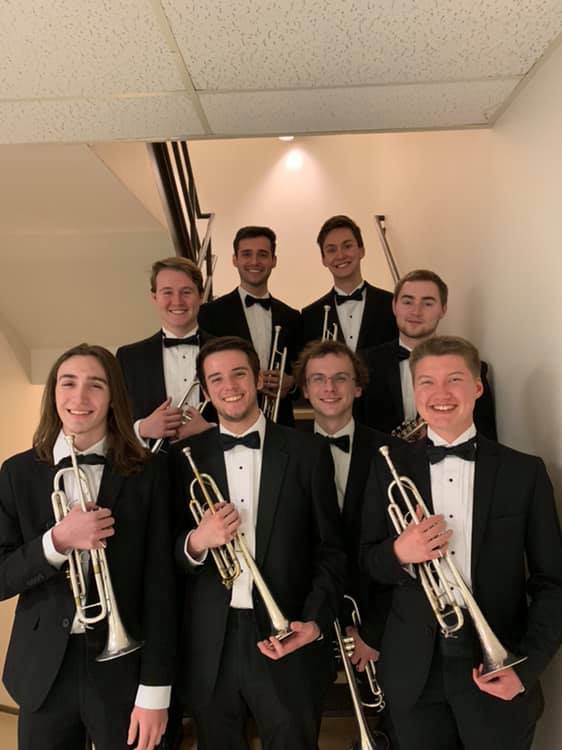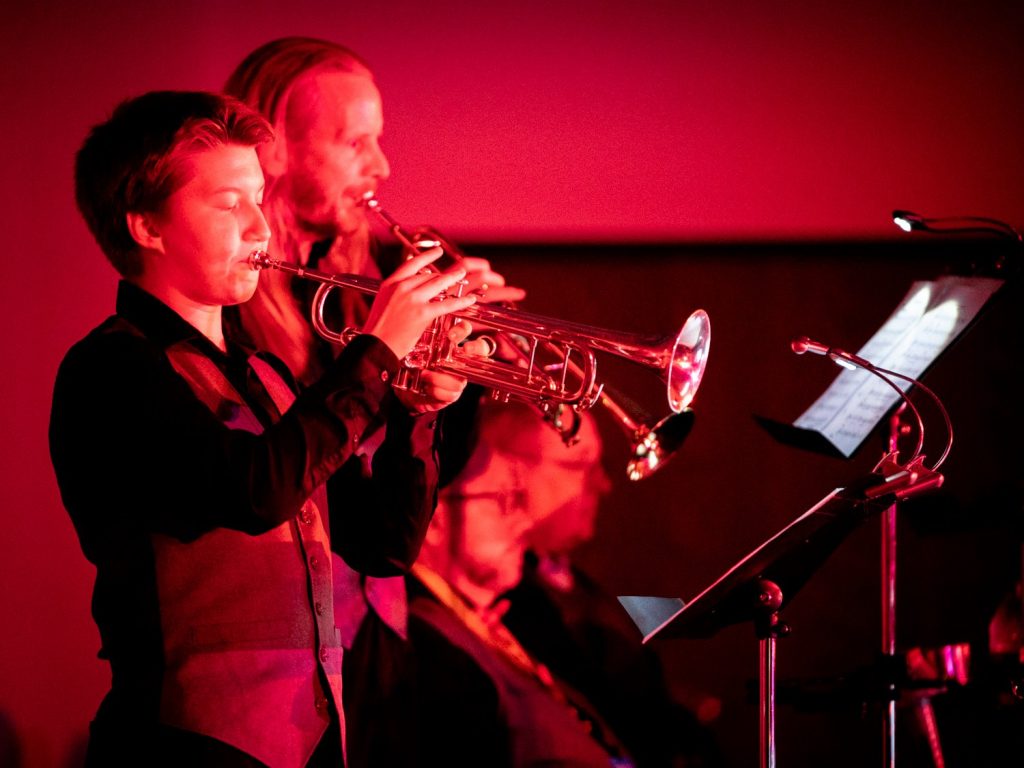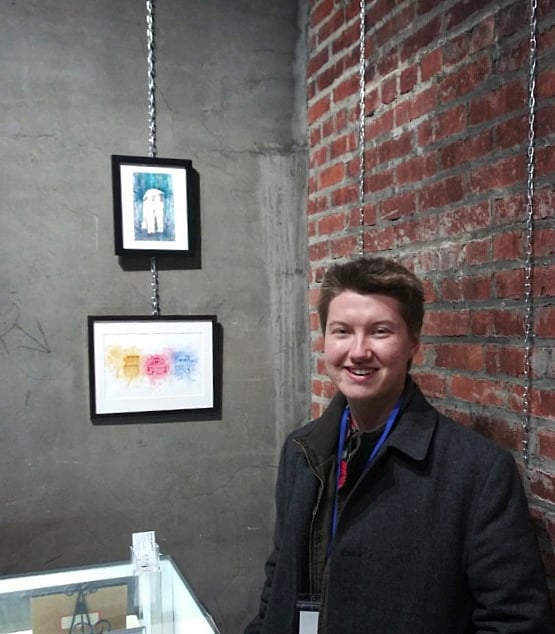
Andy Chapel is a student of the Conservatory of Music and Dance at the University of Missouri- Kansas City. He is in his sophomore year of a Bachelor of Music Education degree, and his primary instrument is the trumpet. He is employed by the Office of Diversity, Equity, and Inclusion as a Diversity Ambassador, and is an LGBTQIA Leadership Scholar (00:17). Andy spends his time outside of his studies as an ambassador for diversity and the LGBTQ community because he identifies within the LGBTQ community, as a transgender man.

What does transgender mean? Labeling someone as transgender means that they have transitioned from their birth gender to one that suits their personality and identity better. Transitioning for Andy came early on, he spent time researching and learning about the LGBTQ community from thirteen years old, and officially transitioned and started to identify as a Transgender man in his late high school years (01:20). Especially early on in his transition, it was difficult for him. Often, people would just not recognize or honor his transition. He’d feel pushed aside or ignored, people were generally apathetic or not sympathetic towards him because transitioning isn’t something that most people ever have to deal with or think about- it really is a foreign concept to almost everyone.
Nobody wants to be ignored. Especially in the developmental golden years that overlap high school, peer acceptance is important to everyone if they’d like to admit it or not. These feelings of being unwanted, overlooked, and unimportant were difficult for Andy. He felt as though he had missed opportunities, and that he had lost the support of many adults and most importantly, his parents. Because it’s so common in American society to segregate things by gender, like our gym classes, Andy also had a lot of trouble fitting into either category which led to further feelings of ostracization (05:00).

This lack of a solid support system isn’t just a problem for Andy. In his case, it’s made finding jobs harder. Does he write his birth name on his resume, or does he write Andy? Of course, he would prefer to be able to just write ‘Andy’ and not worry, but because in the state of Kansas he cannot have his state identification altered, he risks appearing invisible to background checks performed by potential employers. The employers would have to know him by his birth name and gender which is an identity that he is working very hard to bury. Not only is being trans a handful from an employment viewpoint, but Andy’s dating life is also complicated because of his gender identity. Often people shut him down just based on his gender identity, not because of personality traits or incompatibilities (12:20).
Early on in his transition, Andy’s reactions to adversity were passive. He would remove himself from uncomfortable positions. Especially in his high school coed gym class, there were a lot of people being mostly unintentionally, but sometimes intentionally very nasty towards the queer community. People often make these kinds of jokes without realizing that there could be people around that the jokes directly affect. People just want to fit in with their peers, and if their peers are making insensitive jokes, chances are others will join in without realizing the full weight of their words.
The ‘Banality of Evil’, a phrase introduced by political theorist Hannah Arendt in her 1963 book Eichmann in Jerusalem brings to light parallel ideas about the normalization of abuse and oppression. The phrase is defined as meaning “evil that is motivated not by a diabolical will, nor a sociopathic desire, nor even by ideology, but by the desire for professional promotion or simple thoughtlessness and lack of analysis” by Arendt. In much the same way people that didn’t support Nazi ideology collaborated with the Nazi regime, Andy’s peers were collaborating with homophobic ideologies even if they were not homophobic themselves. They collaborated for much the same reasons as well. Even though they weren’t homophobic, they heard others making insensitive jokes and comments, and wanted to gain social status by conforming to what the majority was doing, even if they didn’t think it was right. Those without homophobic beliefs likely did not consider the implications of their jokes, unaware that it was so directly harmful to people nearby.
When the people in the coed gym class would say hateful things and make insensitive jokes, Andy’s strategies consisted mostly of making himself unknown to those who would put him down. He changed into gym clothes in the nurse’s office, instead of in the locker rooms with the rest of the students to help protect his identity. Although he was known as ‘Andy’ to this specific class, not everyone knew the truth about his gender. He refrained from commenting on nasty things that were said out of fear. If these people knew who he really was, what kinds of things would they say or do to him?
Without the know-how or confidence to properly educate people, the easiest possible solution was to hide. Being forward enough to speak out against people who are speaking wrongly against how you identify was not something that Andy was not ready to do at this point in his life, especially when the jokes and abuse targeted him personally. Gym classes specifically are very gendered, so it felt like a ‘David vs. Goliath’ type situation (22:32). Even to this day, Andy is scared by past experiences with ‘toxic masculinity’. Being so unlike other men, and previous poor experiences with “Cis-Het Men”, born males who identify as their born gender and are attracted to the opposite gender, being in places where he’s placed under a lot of scrutiny will likely never be completely comfortable for Andy (27:18).

The lack of good peer and parental support forces trans youth to grow into independence much faster than other youth. For Andy, the biggest move for his own mental health standpoint has been transitioning and then finding the support systems that worked for him. His parents would not be of much help, refusing much financial or emotional support. Seeking validation from like-minded individuals, or even just finding people to talk to that will understand and not question your feelings and beliefs are more helpful than you might think for your mental health, according to Andy (33:23). Coming to the realization that he wasn’t alone in the world, no matter how much it felt that way, was the difference between making it through some situations and giving up.

The biggest side effect of Andy’s growth since transitioning has been his confidence in activism. The independence of being a college student, living on his own, and his involvement with diversity programs, Andy is more comfortable with who he is. He’s met people who he relates to through groups like Transplus Social, a student organization at UMKC that he is the co-president of. Most important to his development is creating these connections and creating an environment in which he can thrive. Compared to his high school experience, UMKC does a very good job from the top down to make sure that people of all shapes, sizes, and beliefs feel at home and involved (12:31). This feeling of acceptance means that Andy can be the force that helps other LBGTQ folk feel at home by standing up for them and for himself. He’s “more open”, a stronger personality and presence can do a lot for other LGBTQ folk’s comfort, and for the non-LGBTQ folk’s awareness and sensitivity towards them. His presence adds a lot more weight and an extra reality check to people who are okay with making transphobic ‘jokes’, and people like him are integral for the advancement of the LGBTQ community.
One of the biggest things that Andy preaches to non-LGBTQ people is to understand that no two trans folk are alike. There isn’t really an accurate image that depicts what everyone looks like, or how all trans folk act. It’s important to expand your horizons on what the idea of a trans person could be, and most importantly be careful to use sensitive language and be aware that these people could be around you at any time. Spending the extra time to research what it means to be in the Trans community, even if you aren’t, goes a long way to ensuring their comfort (36:00).
